|
| On July 23, 2019, the Richmond City Council followed the cities of Livermore and San Francisco in adopting a ban on the sale of e-cigarettes under certain conditions. The vote was on the first reading of an ordinance amendment that will have to be voted on a second time in September. Several council members voiced skepticism, vowing to take another look at it in September (Richmond moves toward e-cigarette ban; critic likens it to Quarter-Pounder ban).
In a Congressional hearing, just two days after the Richmond vote, “House Democrats blasted e-cigarette industry leader JUUL Labs on Thursday for its "deceptive" marketing practices they said were reminiscent of regular cigarette makers' advertising in years past. During the nearly 3-hour hearing of a subcommittee for the House Committee on Oversight and Reform on Thursday, Democrats grilled JUUL executives about the company's social media "influencer" campaign; education and wellness programs, including a summer camp for third graders; and its attempts to evade FDA regulation.” (JUUL Takes Beating From House Dems, Question use of social media "influencers" and supposed anti-tobacco programs in schools)
In the Congressional hearing, the City of Richmond came up:
During a second panel, Ashley Gould, chief administration officer for JUUL Labs, Inc., was asked about JUUL's tobacco prevention curriculum.
Hill said JUUL paid the Richmond, California, Police Athletic League $89,000 to work with youth ages 12-17 who faced suspension for e-cigarette or marijuana use. She noted that JUUL had total control over the information these "potential customers," as Hill called the students, received.
Hill also asked, seemingly incredulous: "Did JUUL honestly sponsor a summer camp for third graders?"
The camp was at Baltimore's Freedom and Democracy Charter School, Hill said.
In exchange for the approximately $134,000 JUUL paid the school, it agreed to share student data including surveys, journals, and activity logs and pre- and post-test scores with JUUL.
All of the grants JUUL distributed focused on "youth prevention or wellness," Gould said. Regarding the question of the camp and data collection, she said she would need to look at any one contract for details.
"Paying to access data for kids as young as eight is alarming ... I can only imagine the possible use of that data in the hands of a Big Tobacco company like JUUL," Hill said.
At another JUUL-focused hearing on Wednesday two high school students testified that a JUUL representative had presented a seminar in school and characterized JUUL products as healthy.
Gould said all of its educational programs and sponsorships have since ended.
It turns out that the Richmond Police Activities League (RPAL) accepted an $89,000 grant from JUUL for an “education and wellness program.” RPAL is not part of the City of Richmond but is an independent 501(c)3 non-profit that has a board dominated by Richmond police officers and other city staff. The volunteer organization is highly regarded as is its executive director, Larry Lewis. RPAL spends almost $1 million annually on youth programs and provides outstanding services.
The Richmond Police Activities League (RPAL) is a nonprofit, community-based organization founded in 1982 offering youth an alternative to the streets.
We are dedicated to supporting young people ages 10-18 holistically as they transition from adolescence to adulthood. We are passionate about having an impact on at-risk youth to help them recognize their full potential and achieve success.
Our programs meet young people "where they are", offering a myriad of programs that are structured and challenging yet enjoyable for our members. Our programs and resources are essential to many young people who frequent our youth center. We provide services to over 2000 youth yearly. Whether they need a meal, homework assistance, a safe place to go during after-school time, or just need a caring adult to talk to, RPAL is responsive to their needs.
Over the course of 35 years, RPAL has served over 50,000 youth. RPAL continues to have a positive impact on the lives of the young people we serve.
Nevertheless it was a bit shocking to find RPAL the second largest beneficiary in the country of JUUL’s effort to establish legitimacy. Larry Lewis provided the following description of the JUUL-funded program:
It is true that Richmond Police Activities League did apply and receive a grant from JUUL Lab for $89,000. But the funding was for Richmond PAL to offer a Youth Diversion Program to first time juvenile offenders and other at-risk youth giving them an opportunity to make amends for their mistakes. The youth that agreed to participate in the 8-10 week program receive life skills and other restorative justice classes, including substance abuse of alcoholic beverages, cigarettes, e-cigarettes, vaping, and illegal drugs. The results of this program includes approximately 20 Richmond youth cleaning up their arrest records and none of these youth re-offending to date. Richmond PAL is offering a great service to these youth with this funding.
We've also held many discussions with RPAL youth about staying away from e-cigarettes and vaping.
I am available to meet with you and work on your plan to ban e-cigarette sales in Richmond. We'll have our next cohort of students in September for the Diversion Program. The part that is not true is teaching a JUUL Lab curriculum to middle and high school students who face suspension for using cigarettes. We did not agree to do that work. I take Larry at his word that the RPAL program did not promote JUUL and vaping, particularly by youth, but it cannot help but place a mantle of legitimacy on JUUL.
When I was in elementary school a long time ago, the entire school was ushered to the auditorium once a week to watch “educational” films. This was before TV became common. It turned out that most of the films were provided by business organizations and came with a subtle or not so subtle marking or sales pitch. I still remember one or more films provided by the tobacco industry, thinly disguised as documentaries, that described the history of tobacco use and smoking, with a not so subtle message that tobacco and smoking were not only socially acceptable but actually healthy. Sometimes I wonder of we have really come very far.
Following is some information provided by a number of organizations with a real educational message about e-cigarettes:
Big Tobacco Is Back With A New Way to Addict Kids: Juul’s Flavored E-Cigarettes
Don’t let sweet-talking ads from Juul fool you – each Juul pod delivers the same amount of addictive nicotine as 20 cigarettes. It’s no wonder Marlboro-maker Altria spent $12.8 billion buying into Juul. Their mint, menthol, fruit, crème and mango flavors have fueled what the FDA warns is a “youth e-cigarette epidemic.”
It’s time to act: Stop flavored e-cigarettes and give our kids, parents and teachers a fighting chance.
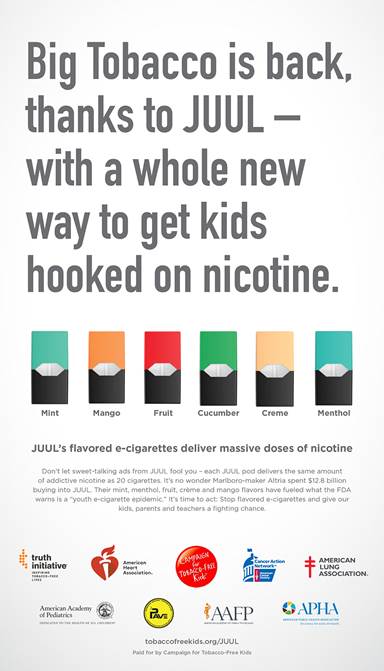
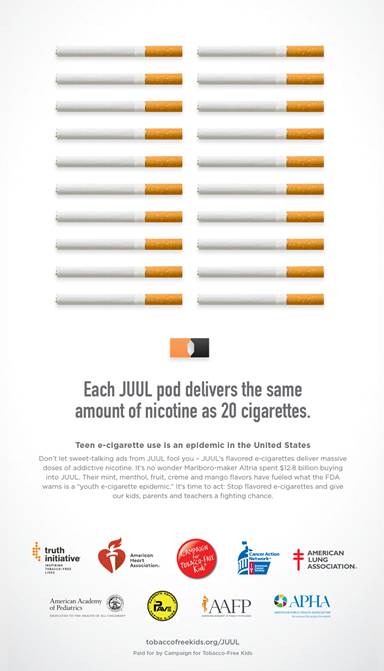
Additional Information
- Youth e-cigarette use in the United States has skyrocketed to what the U.S. Surgeon General and the FDA have called “epidemic” levels
In 2018 alone, e-cigarette use among high school students rose by 78%, to 20.8% of students, according to the National Youth Tobacco Survey. Altogether, more than 3.6 million middle and high school students used e-cigarettes – an increase of 1.5 million in one year. E-cigarettes are addicting a new generation of kids and threaten to reverse decades of progress in reducing youth tobacco use.
- The main cause of this epidemic is Juul, a sleek, high-tech e-cigarette that looks like a USB flash drive
Juul is small and easy to hide, comes in sweet flavors that entice kids and delivers a powerful nicotine hit. Educators and students report an alarming level of Juul use in middle and high schools across the country. Former FDA Commissioner Scott Gottlieb has stated, “There’s no question the Juul product drove a lot of the youth use.”
- Juul is sold in flavors that appeal to youth, including mint, menthol, fruit, crème, mango and cucumber
Research shows that flavors play a key role in youth use of tobacco products, including e-cigarettes. Over 80% of kids who have used tobacco started with a flavored product, and 97% of current youth e-cigarette users have used a flavored e-cigarette in the past month. In addition to Juul, e-cigarettes are sold in over 15,000 flavors, including many flavors like cotton candy, gummy bear and cherry crush that clearly appeal to kids.
- Juul delivers massive doses of nicotine, putting youth users at greater risk of addiction
The manufacturer has stated that each Juul “pod” (cartridge of nicotine) delivers as much nicotine as a pack of 20 cigarettes. However, research by Truth Initiative has found that many young Juul users don’t know the product always contains nicotine.
- Juul’s popularity was fueled by the company’s social media marketing that featured attractive young people in fun, trendy settings
A report by Stanford University researchers concluded that Juul’s launch marketing was “patently youth oriented” and “subsequently Juul’s principal advertising themes have been closely aligned with that of traditional tobacco advertising.”
- Juul’s success prompted Altria, maker of the best-selling Marlboro cigarette, to pay $12.8 billion for a 35% stake in Juul
The December 2018 deal brought together the companies that sell the most popular e-cigarette and cigarette brands among kids in Juul and Marlboro.
- Juul and other e-cigarettes pose serious risks to the health of young people
A 2016 Surgeon General’s report concluded that youth use of nicotine in any form, including e-cigarettes, is unsafe, causes addiction and can harm adolescent brain development, which impacts attention, memory and learning. E-cigarettes can also expose users to harmful and carcinogenic chemicals such as formaldehyde and lead.
- Studies have found that young people who use e-cigarettes are more likely to become smokers, and many are low-risk youth who would not have otherwise smoked cigarettes
A January 2018 report by the National Academies of Sciences, Engineering and Medicine concluded, “There is substantial evidence that e-cigarette use increases risk of ever using combustible tobacco cigarettes among youth and young adults.”
Strong Action Needed to Protect Kids
- The FDA regulates tobacco products, including e-cigarettes, but has yet to take effective action to protect kids and reverse the youth e-cigarette epidemic. It is especially critical that the FDA prohibit the flavored products that have fueled this epidemic.
- Because the FDA has failed to act, several bills have been introduced in Congress to crack down on flavored tobacco products. House Energy and Commerce Committee Chairman Frank Pallone (D-NJ) and Rep. Donna Shalala (D-FL) have introduced the comprehensive legislation that includes prohibition on flavored tobacco products. Sen. Dick Durbin (D-IL), Sen. Lisa Murkowski (R-AK), Rep. Diana DeGette (D-CO) and Jamie Raskin (D-MD) have introduced the (SAFE Kids Act). Rep. Rosa DeLauro (D-CT) has also introduced lto stop tobacco companies from targeting kids with flavored products.
- Until the FDA acts, cities and states should continue their growing efforts to prohibit the sale of all flavored tobacco products. San Francisco in 2018 became the first city to do so, and other cities have since passed or are considering similar measures.
LEARN MORE
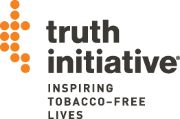 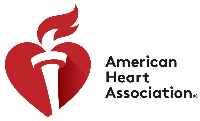 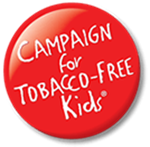 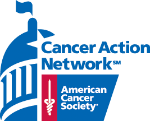 
U.S. RESOURCES
GLOBAL RESOURCES
INDUSTRY WATCH
YOUTH INITIATIVES
ABOUT US
MEDIA
OUR WEBSITES
GLOBAL HEALTH
ADVOCACY INCUBATOR |

